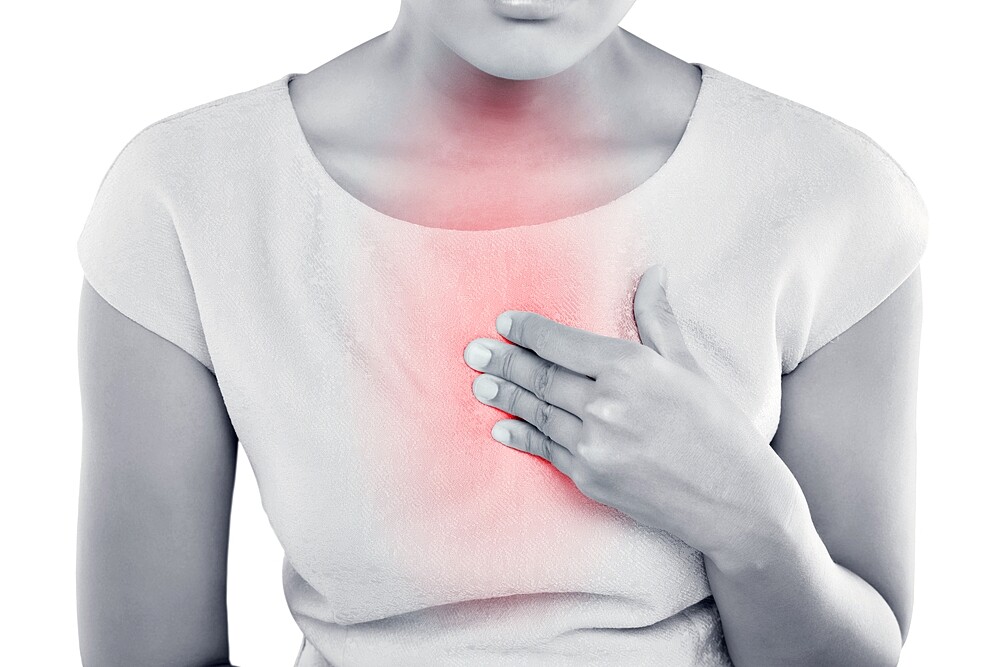Heartburn is a common problem. We explain which causes can be responsible for the unpleasant symptoms and what helps.
What is heartburn?
In heartburn, stomach acid reaches high up the esophagus or even into the mouth and irritates the sensitive mucous membrane, which can lead to a feeling of pressure behind the breastbone and to burning pain. The reflux is also called reflux. Heartburn sometimes occurs, for example, through the consumption of fatty foods or acidic drinks and is then rather harmless. If heartburn occurs frequently, however, reflux may also be present. In this case, a functional disorder of the sphincter muscle that seals the stomach against the oesophagus is usually the cause of the symptoms.
Distress call of the esophagus
Patients often first notice the reflux by acidic burping. If the heartburn only occurs from time to time, often home remedies against heartburn already help to get it under control. If the reflux disease is behind it, drugs and an adjustment of the own lifestyle can help. You should not ignore the symptoms: if left untreated, frequent heartburn can lead to inflammation of the mucous membrane of the esophagus, among other things.
Causes of frequent heartburn
There are several possible causes of heartburn. These include:
- Dysfunction of the sphincter muscle: Why the sphincter muscle between the stomach and oesophagus can no longer perform its function properly is not conclusively clarified, but there are factors that increase the risk. These include frequent consumption of alcohol and nicotine, for example, as both relax the muscles.
- Nutrition: Among other things, foods containing fat and sugar, chocolate, juices (especially from citrus fruits) and coffee favour heartburn.
- Medicines: The likelihood of heartburn is increased by certain antibiotics or antihypertensive drugs, for example.
- Mental stress: Persistent stress and psychological pressure also increase the risk of heartburn.
- Severe obesity: Especially when a lot of fat is stored in the abdomen, it also increases the pressure there, pushing the stomach contents upwards.
- Pregnancy: Pregnancy can also lead to increased pressure in the abdomen and thus to heartburn.
- Various diseases: Heartburn is one of the symptoms of various diseases. These include diaphragmatic hernia, inflammation of the stomach lining or oesophagus, irritable stomach or diabetes.
Symptoms of heartburn
Heartburn does not have its name for nothing – it causes “boiling” stomach contents to rise up into the oesophagus, causing burning pain. The following symptoms can also occur:
- (Sour) burping, often of acid, but also of chyme
- Feeling of pressure in the upper abdomen
- Burning pain in the chest area
- Sometimes hoarseness, coughing or a compulsive throat irritation in the morning
- Attacked tooth enamel
- Unpleasant taste in the mouth
What consequences can persistent heartburn have?
If heartburn only occurs from time to time, you don’t have to worry about it. However, if the symptoms occur more frequently, these secondary diseases can occur:
- Inflammation of the mucous membrane of the oesophagus, which promotes the development of ulcers and can lead to narrowing of the oesophagus
- Pathological cell changes in the lower part of the oesophagus, which can lead to a malignant tumour in the oesophagus
Treatment: How to get heartburn under control
Gentle household remedies can help if heartburn is only mild or occurs from time to time. These include:
- Lukewarm, still water: The water dilutes the gastric juice and ensures that it runs back into the stomach.
- Starchy foods: Dry white bread or rusks can bind excess stomach acid, which reduces the pain.
- Chewing gum: Chewing gum promotes saliva production, which also dilutes and additionally neutralises stomach acid.
- Milk: Drinking a glass of milk is also said to neutralise stomach acid.
Treatment for heartburn: What else helps?
If the symptoms are too severe and/or home remedies no longer help, medication can be used to relieve heartburn in consultation with the doctor. If even these do not help, an operation is sometimes recommended.
How can I avoid occasional heartburn?
Since an unhealthy lifestyle is one of the most common causes of heartburn, in many cases it helps to change one’s own behaviour. The following tips can help prevent heartburn and protect the esophagus from stomach acid:
- Abstention from alcohol and nicotine
- Abstaining from food containing fat or sugar, acidic drinks and coffee, especially in the evening
- Regular exercise, at least two to three times a week for at least 30 minutes each
- The last meal should be about four hours before going to bed
- Overweight is reduced at best

